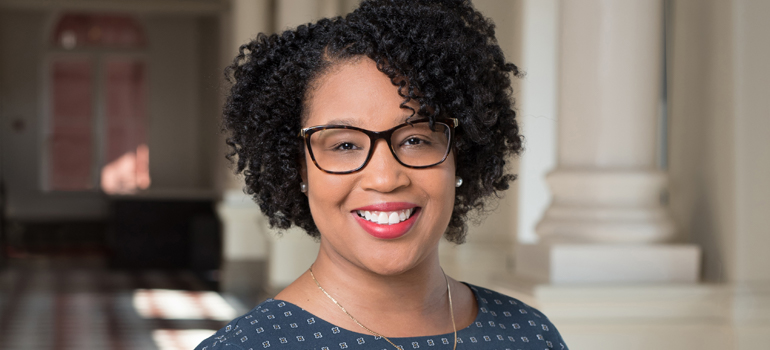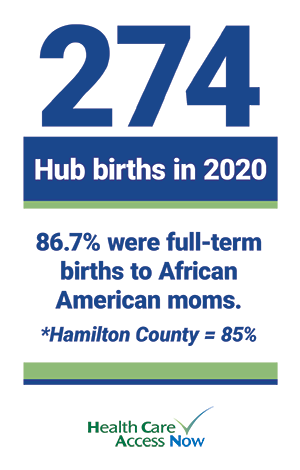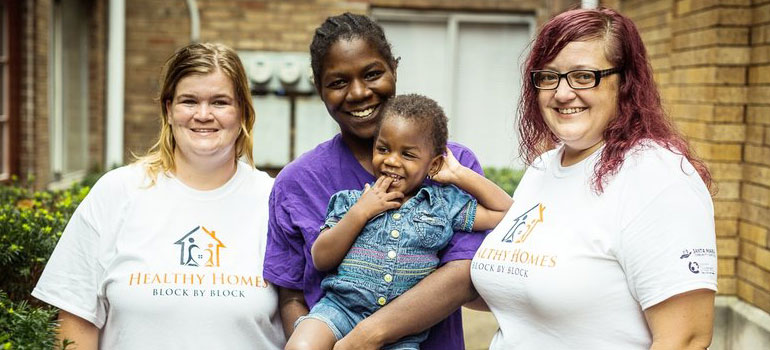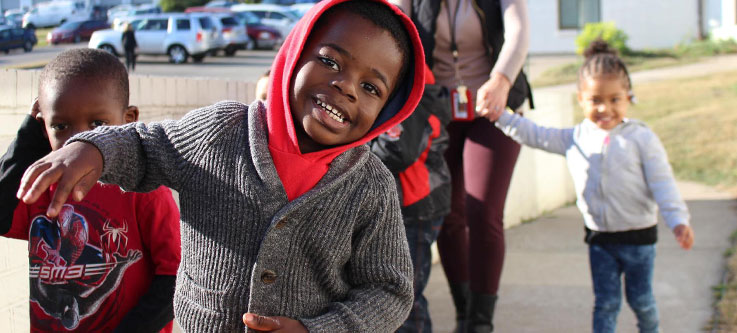Denisha Porter: All-in with racial equity

“I get to lead a bunch of wonderful people around policy and systems change,” says Denisha Porter of her position as Director of the All-In Cincinnati Coalition. Driving solutions is her goal, and she always keeps an ear open to suggestions from and needs within the community.
All-In Cincinnati works to dismantle racial inequities with the objective of uplifting Black women in Hamilton County. They concentrate on transforming five priority areas: health, housing, economic mobility, education, and justice.
Truth, racial healing, and transformation
All-In Cincinnati has adopted the W.K. Kellogg Foundation (WKKF) framework of Truth, Racial Healing, and Transformation, says Porter. This structure consists of “having courageous conversations on race” (Truth), finding ways to heal and build true relationships based on mutual respect (Racial Healing), and “making policy and system changes” (Transformation).
Porter—and everyone who works with the coalition—is an admirer of Dr. Gail Christopher, the former Senior Advisor and Vice President of the WKKF; “architect of the racial healing framework” they use; and current consultant, trainer, and speaker on social change and racial healing. After she presented at a coalition meeting in 2019, “everyone fell in love with her model.”
They brought her back for Cincinnati’s National Day of Racial Healing in January of this year. All-In Cincinnati collaborated with The Center for Truth, Racial Healing, and Transformation at the University of Cincinnati (TRHT-UC) to host the virtual event. Dr. Christopher gave the keynote address.
This summer, All-In Cincinnati will be implementing racial healing circles, based on Dr. Christopher’s teachings, in partnership with TRHT-UC. “The whole idea is to get people together to understand the common humanity of people and the ways in which everyone has been traumatized by racism. We’ll have bold conversations about how to heal and move forward together,” Porter says.
She envisions virtual conversations consisting of 12-18 people addressing moderated questions that will guide them through “tough conversations, sharing different things that have happened to them on their journey.”
Porter stresses that All-In Cincinnati is an action-oriented coalition. “Despite COVID-19, we have been able to make two to three policy changes in each of our priority areas this year,” she says. “The coalition members and core team really kicked into gear during the pandemic.”
For example, they endorsed ballot Issues 7 and 17. Voters approved both Issues in 2020. Issue 7 levied a sales tax increase to 0.8%, with the funds going to revamp Cincinnati’s Metro bus system and to infrastructure repair. Issue 17, called the Cincinnati Preschool Promise, was a renewal of an existing operating levy providing funding to connect teachers with specialized training and students with tuition assistance, services, and technology.
Racial equity in health Care
Porter has a master’s degree in public health. In a prior position, she led the Creating Healthy Communities Coalition at the Cincinnati Health Department, at which she was “able to create 400 systems, policy, and environmental changes in the region.”
Health Care Access Now (HCAN) is “a part of the All-In Cincinnati strategic plan” in its health priority area. “We focus on Community Health Workers” (CHWs). Most recently, COVID-19 has taken center stage. “We’re making sure CHWs can dispel myths related to the virus and the vaccine,” Porter says. She serves on All-In Cincinnati’s health subcommittee, along with Sarah Mills, HCAN’s CEO.
All-In Cincinnati’s priority areas intersect to form a holistic approach to its mission. For example, at a recent meeting, a representative from Cincinnati Public Schools presented about it its antiracism educational policy, and the different priority area subcommittees were able to process that information through their particular lenses. “We can look at it from all different perspectives.”
To undo implicit biases in health care (and any other sector), Porter recommends taking the Racial Equity Matters course, which is hosted by the Greater Cincinnati Foundation and taught by the Racial Equity Institute.
“There are two classes. ‘Groundwater’ helps [participants] get to know the history of systemic racism and implicit biases. ‘Phase 1’ is a deeper dive, where [instructors] take you through historical timelines to increase understanding of how different policies impacted black people. It’s fascinating.”
Porter has spent her career dedicated to health equity, and her work at All-In Cincinnati continues that effort. She’s fulfilled by their many successes and is “always proud to lead coalitions.”





